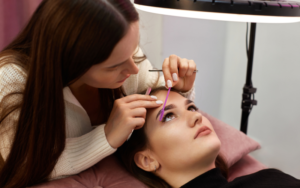Are your beautiful lash extensions causing more frustration than flutter? It’s a common dilemma among many women: the allure of luscious lashes often comes with an unwelcome side effect—itchy eyelash extensions and irritated, red eyes.
You delicately avoid rubbing your lash line, fearing you might dislodge those meticulously placed extensions. But what’s the solution to this discomfort? Wondering how to itch your eye with lash extensions?
Let’s explore effective strategies to soothe your eyes and maintain your glamorous look.
Table of Contents
How To Itch Your Eye With Lash Extensions
Eyelash extensions can sometimes cause itchy, red, or irritated eyes. There are several ways to handle discomfort and prevent it from returning.
Immediate Relief Methods
Cold compress: Applying a cold compress can quickly reduce swelling and itchiness.
To use, soak a clean cloth in cold water, wring it out, and gently press it onto your closed eyelids for 5-10 minutes.
Antihistamines: Over-the-counter oral antihistamines can help reduce allergic reactions. This is useful if the itching is due to allergens or sensitivities.
Avoid rubbing your eyes: Rubbing can make the itchiness and irritation worse. Instead, rely on gentle compresses to soothe the area.

Identifying the Underlying Cause
Patch test: Before getting lash extensions, a patch test is critical. It helps identify if you are allergic to any of the products, such as lash glue. This preventive step can save a lot of hassle and discomfort later.
Check for formaldehyde: Some lash adhesives contain formaldehyde, which can cause contact dermatitis or a chemical burn.
If you have sensitive or dry eyes, look for hypoallergenic or formaldehyde-free adhesives.
Symptoms to monitor: Pay attention to symptoms like red, watery, or bloodshot eyes. These might indicate an allergic reaction or irritation that requires switching products or consulting a professional.
How To Itch Your Eye With Lash Extensions: Long-term Solutions
Switch to hypoallergenic products: For those with allergies or sensitive eyes, using hypoallergenic lash glue can prevent future issues. These glues are designed to cause fewer reactions.
Regular cleaning: Keep your extensions clean to avoid buildup of oils and debris. A gentle cleanser and regular maintenance can prevent irritation and infections like blepharitis.
Consult a professional: If problems persist, consult a lash technician or a doctor. They can provide specific advice or treatments tailored to your needs.
Related: How to Take Care of Eyelash Extensions: Top 10 Tips
How To Itch Your Eye With Lash Extensions: Common Issues
Many people face issues with lash extensions. Itching and irritation are common problems. This can be due to a sharp base on the extensions, which can poke and scratch the eyelid.
Additionally, formaldehyde fumes from the adhesive can lead to contact dermatitis and allergic reactions. Poor application techniques can also cause the extensions to pull at natural lashes, leading to discomfort.
The Role of Lash Adhesive in Comfort
The right adhesive is crucial for comfort. Traditional eyelash extension glue often contains formaldehyde, which can be irritating.
Using hypoallergenic glue can reduce the risk of allergies and irritation. Furthermore, the inclusion of carbon black in some adhesives can cause reactions for those with sensitive eyes. Choosing the right glue can make a significant difference in your overall experience with lash extensions.

Proper Care for Lash Extensions
Proper care for lash extensions involves daily cleaning, using the right products, and knowing when to seek help from your lash artist. Good hygiene and gentle techniques are crucial for the health of your lashes and eyes.
Daily Cleaning Techniques
To maintain your lash extensions, it’s important to clean them daily.
Use mild, oil-free cleansers to wash your face and lashes. Avoid using cotton pads as they can snag and pull on the extensions.
Instead, use clean fingers or a spoolie brush to gently clean around the lashes. This helps remove dirt, oil, and makeup residue.
Always pat your face dry with a soft towel, avoiding rubbing your eyes.
Brushing your lashes with a clean spoolie helps keep them from clumping and maintains their shape.
Practicing good hygiene daily will extend the life of your lash extensions and keep irritation at bay.
Choosing the Right Products
Choosing the right products is essential for maintaining lash extensions.
Use hypoallergenic, oil-free makeup removers and cleansers to avoid breakdown of the adhesive. Opt for products labeled safe for extensions or created specifically for them.
Avoid using waterproof mascara, as it can be difficult to remove and lead to build-up on your lashes.
Instead, if you feel the need for mascara, choose one that is water-based and designed for lash extensions.
Be careful with facial creams and sunscreens, ensuring they don’t touch your lashes as oil-based products can weaken the glue.
When to Contact Your Lash Artist
If you experience itching, redness, or any signs of infection, it’s a good idea to contact your lash artist.
They are trained professionals and can check for issues like improper application or allergic reactions.
Seeing your lash artist regularly for touch-ups usually every 2-3 weeks can help keep your extensions looking their best.
They can also offer advice tailored to your skin type and lash needs, ensuring your extensions remain healthy and beautiful.
How To Itch Your Eye With Lash Extensions FAQs:
Why do I have itchy eyelash extensions and red eyes?
Itchy eyelash extensions and red eyes can be caused by several factors, including allergic reactions to lash glue ingredients like formaldehyde, improper application irritating the lash line, or sensitivity to lash extension materials.
How can I soothe itchy lash extensions and reduce redness?
To alleviate itchiness and redness, try applying a cold compress to your closed eyes. Avoid rubbing and instead use gentle cleaning techniques with a mild cleanser to keep your lash line free from irritants. If you are watching TikTok – make sure you’re getting good advice!
Should I take oral antihistamines for itchy lash extensions?
If your symptoms persist, oral antihistamines can be effective in reducing allergic reactions that cause itchiness and red eyes. Consult with a healthcare professional before using them.
Can I still have natural lashes with lash extensions?
Yes, you can maintain your natural lashes while wearing extensions. Proper care, including gentle cleaning and avoiding harsh products, helps preserve the health of your natural lashes.
How can I prevent itchy eyelash extensions in the future?
Choosing hypoallergenic lash glue and having your extensions applied by a skilled technician can reduce the likelihood of itchiness. Regularly cleaning your lashes and avoiding touching your eyes can also help prevent irritation.
What are some common reasons for itchy eyes with lash extensions?
Itchy eyes with lash extensions can result from allergies to lash glue ingredients like formaldehyde fumes, improper application techniques that irritate the eye area, or sensitivity to the adhesive or extension materials.
Is it safe to take oral antihistamines for relief from itchy eyes with lash extensions?
Oral antihistamines can provide relief from allergic reactions causing itchy eyes. However, it’s essential to consult with a healthcare provider before use to ensure safety and effectiveness.
What should I know about the lash extension application process?
The application process involves carefully adhering synthetic or natural fibers to your natural lashes using specialized glue. Proper application by trained lash professionals is crucial to prevent discomfort and ensure a natural look.
How can I care for my eye area to prevent discomfort from lash extensions?
To maintain comfort and reduce irritation around the eye area, gently cleanse your eyelids and lashes daily with a mild, oil-free cleanser. Avoid rubbing your eyes and use a cold compress to soothe any itchiness or redness.
What’s the good news about hypoallergenic glue?
Hypoallergenic lash glue is formulated without common allergens like formaldehyde, reducing the risk of allergic reactions and making it suitable for sensitive eyes.


![You are currently viewing How To Itch Your Eye With Lash Extensions [2024]](https://lipslashesandnails.com/wp-content/uploads/2024/07/itcheyeswithlashextensions.png)
![Read more about the article Ultimate Guide To Different Lengths of Eyelash Extensions [2024]](https://lipslashesandnails.com/wp-content/uploads/2024/03/Different-Lengths-of-Eyelash-Extensions-300x188.jpg)


Pingback: Can You Use Micellar Water to Remove Eyelash Extensions Safely? - Lips Lashes & Nails
Pingback: Why Do My Eyelashes Hurt? Common Causes and Relief Tips